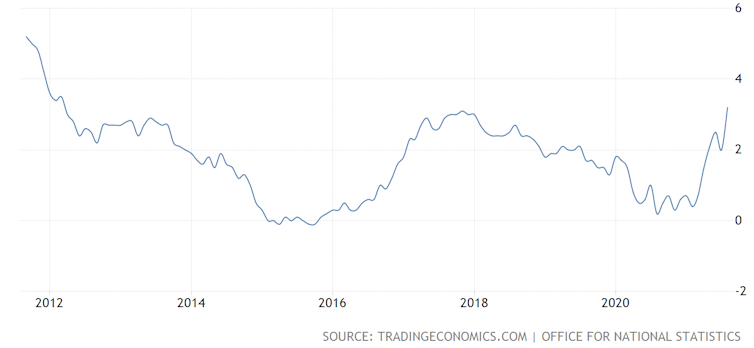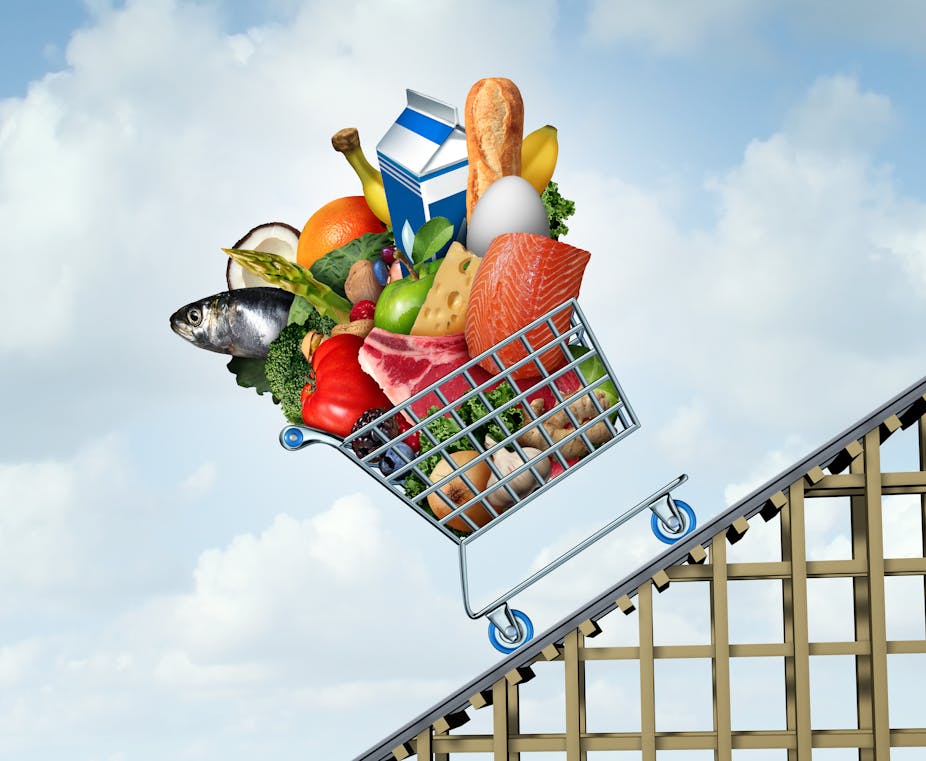Consumer price inflation in the UK rose by 3.2% year on year in August, the highest annual rise in nearly a decade. This was 1.2 percentage points above the July number, making it the biggest month-on-month rise since records began in 1997. Inflation is also an issue far beyond the UK: in the US, it is currently running at 5.3%, for instance.
Bank of England economists conveniently attribute these hefty rises to temporary factors and claim that inflation will soon stop rising in the UK without much intervention. They point out that prices a year ago were artificially subdued and as they returned to more “normal” levels, we were destined to get high measures of inflation.
One example would be petrol prices. Subdued demand for commuting helped to lower them to about 113p per gallon at the pump in 2020, yet as travel returned to pre-pandemic levels, increased demand for petrol has pushed prices to around 135p. Or you could look at the Eat Out to Help Out scheme, which lowered the prices people paid in restaurants in summer 2020. As the scheme ended, prices hiked suddenly, which increased inflation.
The argument from the optimists is that these one-off shifts will wash through the system and prices will stabilise at their current levels. Yet not all price hikes can be attributed to temporary factors. There are also deeper, structural factors at play.
What causes inflation
Inflation is measured by the Office for National Statistics, which records the prices of thousands of products. These prices are defined by a never-ending interplay between supply and demand in the economy (assuming the government doesn’t intervene to fix prices in some way).
An abundance of excess produce or services means that prices are likely to fall, as we saw with petrol prices. On the other hand, demand for products that can’t be fully satisfied by the supply usually pushes prices higher. This happened with hand sanitisers in 2020, for instance, and more recently with second-hand cars.
Ten years of UK inflation

Besides COVID, Brexit has certainly affected prices. It has rendered trade with the UK’s neighbouring countries more difficult and expensive. This is contributing to shortages of products, pushing prices up.
Brexit has also hindered production in the UK by alienating a percentage of EU nationals working in the country. Shortages of fruit pickers, lorry drivers and NHS nurses have been pushing wages higher and making UK production more expensive. And there is the potential for more political and trade disruptions between the UK and EU, not least over Northern Ireland, which could make products and production even more expensive.
Another structural factor relevant to inflation is the British pound. The UK imports hundreds of billions of pounds worth of consumer products and raw materials. A lower pound sees the country paying more of its currency to purchase products from abroad, making these products more expensive in pounds.

The pound has already been weakening against its rivals for several years due to economic factors like weaker productivity. This falling trajectory is also likely to continue due to political factors such as the looming second Scottish independence referendum and civil unrest in Northern Ireland.
Also, as the Bank of England keeps turbocharging the economy with vast amounts of money through quantitative easing (QE), there should be downwards pressure on the value of the pound. The only thing that spares the pound from big falls is the fact that central banks of other major currencies are doing the same – for the time being.
Loose monetary policy also potentially contributes to higher inflation for another reason. Record low interest rates encourage consumers to borrow, while QE encourages banks to lend more, since it boosts the value of the assets on their balance sheets. This can fuel demand for products such as cars, electronics and white goods (such as washing machines, dishwashers and fridges). Indicatively, though house prices are (wrongly) not counted in consumer price inflation, low interest rates have contributed to substantially higher prices in that market, as well as in stock market shares.
Where we go from here
A little inflation in an economy can be positive, to the extent that it spurs consumers to buy things before the price rises. It is also a way of lowering the government’s debts in real terms, which is attractive after the massive borrowing to pay for the COVID stimulus package.
High inflation is a problem, though, as it erodes people’s real incomes, meaning they consume less and businesses make less money. This is why the Bank of England was granted independence from the UK government in the 1990s, with a mandate to keep inflation around 2%.
The UK government and Bank of England should therefore work to address some of the longer term, structural factors which can pin inflation consistently high –particularly when “supply shocks” like a new COVID variant or trade sanctions on China could further imbalance supply and demand in the short to medium term.
Shortages of people and skills in the labour market must be addressed before the production capacity of the UK is scarred by more businesses relocating and outsourcing production. Through Brexit, the UK public voted to take control of migration, not shut it down when it’s needed.
Free trade in products and services with UK’s neighbouring continent is also paramount for the country’s long-term competitiveness, but here things are admittedly difficult. The EU will never accept the existential danger of a country benefiting from its massive free market without fully subscribing to its policies and regulations. Damage control seems to be the only way forward here, which underlines the importance of reaching a lasting agreement with the EU over Northern Ireland.
Finally, the Bank of England should consider taking its foot off the QE accelerator sooner rather than later, before inflation expectations are crystallised into further price increases. Money that is too abundant and ultra-low interest rates not only inflate asset prices but also boost corporate borrowing and provide a temporary lifeline to zombie companies, laying the groundwork for the next crisis.

